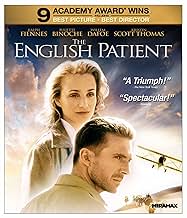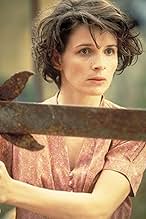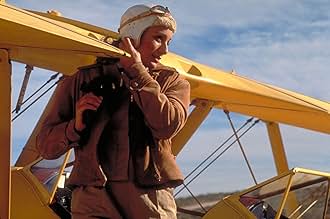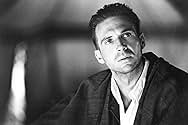No final da Segunda Guerra Mundial, uma jovem enfermeira atende a uma vítima de acidente de avião gravemente queimado. Seu passado é mostrado em flashbacks, revelando um amor fatídico.No final da Segunda Guerra Mundial, uma jovem enfermeira atende a uma vítima de acidente de avião gravemente queimado. Seu passado é mostrado em flashbacks, revelando um amor fatídico.No final da Segunda Guerra Mundial, uma jovem enfermeira atende a uma vítima de acidente de avião gravemente queimado. Seu passado é mostrado em flashbacks, revelando um amor fatídico.
- Direção
- Roteiristas
- Artistas
- Ganhou 9 Oscars
- 62 vitórias e 78 indicações no total
- Direção
- Roteiristas
- Elenco e equipe completos
- Produção, bilheteria e muito mais no IMDbPro
Avaliações em destaque
"The English Patient", based on a novel by the same name by Michael Ondaatje, is like "The Godfather: Part II" (1974) in the sense of how it's constructed. It's a blending of two stories: the past and the present and it all revolves around the titular character: an English patient in the post years of World War Two. Ralph Fiennes plays the English patient, who has been scarred for life by a plane crash, and being taken care of in an isolated church by a single nurse played marvelously by Juliette Binoche. Apart from bonding with her raspy-voiced, troubled patient, Binoche comes to learn about his past when a stranger (Willem Dafoe) arrives and the two men appear to know each other.
That's just one of the two beautifully crafted stories that shape this film. The other one, told in flashback, is the patient's past, before he was scarred and dying in a bed. The story of the present mixed with the patient's past and his love affair that tragically changed his life forever.
To be blunt, "The English Patient" is a love story blended with a sweeping epic sensation and it blends magnificently. What I really admired about the love story between Ralph Fiennes and Kristin Scott Thomas was how passionate, how obsessive, how enchanting it was shown on screen. Usually in love stories, such as Minghella's later "Cold Mountain" (2003), the romantic elements seem far more lustful than obsessive to me. Some of the love scenes feature elements that may tend to be associated more with lust than love, but still, because it is so well developed and not rushed and not exploited out of proportion, we can believe that there is a sure, true love between these characters. It reminded me a lot of "Vertigo" (1958) in how well the filmmakers and performers convinced us that these were two actual human beings who truly fell in love with each other.
Performances all around were great. I was especially enthralled by the performance by Juliette Binoche, who took home the Oscar for her performance the following year. I also liked Willem Dafoe playing the sort of cynical, questionable character that he's always quintessential at playing. And of course I can't leave out Fiennes and Scott Thomas and their portrayals of two very passionate lovers.
Despite my enormous enthusiasm for this epic, I would be dishonest if I were to describe it as a perfect film. There are two flaws that I cannot glance over. Number one, it is a little too long and the reason for this is my second complaint, there are a few unnecessary subplots. I was not enchanted or particularly interested with the second love story between Binoche and a bomb specialist played by Naveen Andrews. My research has led me to assume that this plot element comes from the original book and I'm sure it worked perfectly in there, but in the film, it just seems a little distracting and the relationship between the two characters didn't fascinate me. I was far more interested by Fiennes character and his relationships with his two leading actresses.
Nevertheless, these two flaws are easily forgivable even if they do slow things down a bit. Those put aside, "The English Patient" is an extraordinary achievement of film-making. To me, it was sort of like an insane mix up between "Casablanca" (1942) and "Lawrence of Arabia" (1962), two remarkable and better films, and this effective blend proved to be well worth my time. It is a real shame that Anthony Minghella has left us. For he was a truly gifted filmmaker. This is all the evidence anybody needs.
This is quite a modern epic. It has the running time of an epic, it has the gorgeous cinematography of an epic, it has the acting of an epic and it has a story of love (lust) against the backdrop of major events in history. Even though it changes or leaves out a significant amount of the original novel it still manages to be a great mix of passionate desire and mystery. The mystery of the story is represented by the thief Caravaggio who casts light on what he knows of de Almásy's past (as he sees it) while the love story is unfolded as it develops in a passionate affair between him and Katherine, a colleagues' wife. The story is compelling enough to carry the long running time, at times the pace seems a little slow and when I saw it in my local multiplex there were some moments where large portions of the audience seemed to be shifting in their seats.
The love' of the story was interesting as it seems to be contrasted with Hana's relationship with Kip the bomb disposal expert. While de Almásy's relationship with Katherine starts as lust and desire before growing into what seems to be love (or could be grief at the result of their affair), Hana's is portrayed as purer and more careful as she fears those she loves will die. This difference helped me see that the film did want to show the destructive power of lust and affairs, however the fact that the central relationship was based more on lust than love took away from the emotional core of the story.
The acting is almost impeccable. Fiennes is excellent even when he is lost behind an unrecognisable mask of burnt flesh. Thomas is actually very good, I find she tends to be very wooden in some things but this type of very English character brings the best out of her. Binoche is excellent as Hana and carries the heart of the film. Dafoe is truly excellent - his element of the story is the mystery and he does it well. He is a great actor and deserves to be in things this good. The support cast include plenty of good actors including Colin Firth, Jurgen Prochnow and Naveem Andrews.
The film is beautifully shot - even though it's all a bit too picturesque to be real! However the director can handle himself well with many different scenes - a tense bomb diffusal, a passionate love scene, a dangerous sand storm etc. Overall the slow pace may frustrate some younger audiences but this is a really good film that draws it's values from classy sources.
It's WWII; flying above the African desert, Hungarian Count Laszlo de Almasy (Ralph Fiennes) is shot down, his biplane mistaken for an enemy aircraft. And though he survives the crash, he is severely burned. To his great good fortune, however, he is rescued by a tribe of nomads and winds up in a hospital. But existing conditions are governed by circumstances of war, and Almasy soon becomes one of many patients being transported via convoy to a different facility. Upon reaching Italy, he is too weak and ill to continue on, and a Canadian nurse, Hana (Juliette Binoche), volunteers to stay behind with him at an abandoned monastery.
Hana soon discovers that her charge is something of a man of mystery, as Almasy remembers nothing of his past, and not even his own name. Thought to be English, the only clues pointing to who he is are contained in a book found in his possession after the crash, but even they are as cryptic as Hana's patient. Slowly, however, under prompting from Hana, Almasy begins to remember bits and pieces of his life, and his story begins to unfold. And his memory is helped along even more by the appearance of a mysterious stranger named Caravaggio (Willem Dafoe), who suspects that Almasy is the man he's been looking for-- a man with whom he wants to settle a score. But, burned beyond recognition, Almasy may or may not be that man. Meanwhile, Almasy's memories continue to surface; memories of a woman he loved, Katherine Clifton (Kristin Scott Thomas)-- as well as memories of Katherine's husband, Geoffrey (Colin Firth). And, crippled in mind and body as he is, those memories become the only thing left to which he can cling with any hope at all, even as his life seems to be slipping farther away with each passing moment.
In addition to directing, Anthony Minghella also wrote the screenplay for this film, which he adapted from the novel by Michael Ondaatje. The result is an epic saga presented in the tradition of Lean's `Doctor Zhivago' and `Lawrence of Arabia'; a magnificent film that fills the screen and the senses with unprecedented grandeur and beauty. Simply put, Minghella's film is genius realized; crafted and delivered with a poetic perfection, watching it is like watching a Monet come to life. From the opening frames, Minghella casts a hypnotic spell over his audience that is binding and transporting, with a story that has an emotional beauty that equals the engagingly stunning and vibrant images brought to life by John Seale's remarkable cinematography; images that virtually fill the screen as well as the soul of the viewer. In every sense, this is a film of rare eloquence, with a striking emotional capacity that facilitates an experience that is truly transcendental. Nominated in twelve categories, it deservedly received a total of nine Oscars, including Best Picture, Director, Supporting Actress (Binoche) and Cinematography.
If one had to choose a single word to describe the `essence' of this film, it would be `excellence.' Even an extraordinary film, however, does not receive nine Oscars without performances that are extraordinary in kind; and the performances given by Ralph Fiennes and Kristin Scott Thomas here transcend the term `Oscar worthy.' Nominated for Best Actor for his portrayal of Almasy (Geoffrey Rush was awarded the gold for `Shine'), Fiennes has never been better, achieving an emotional depth with his character that is nearly palpable. Private and introspective, Almasy is not by his very nature an individual to whom the audience will be able to form an intimate connection; Fiennes, however, finds a way to open that emotional door just enough to let you in, enough so that you taste the honest passion welling up within him. And it works. Almasy does not seek your friendship; he will, however, gain your compassion.
Kristen Scott Thomas, too, received an Oscar nomination for Best Actress (Frances McDormand received the award for `Fargo') for her portrayal of Katherine, a woman whose stoic countenance masks the emotional conflict raging within her, born of the forbidden passion that enslaves her and yet to which she gives herself willingly, casting off her shackles of repression to embrace a love so strong it threatens to consume her. The reserve Katherine must maintain evokes the empathy of the audience, as Scott Thomas successfully mines the emotional depths of her character to the greatest possible effect. It's the kind of performance that draws you in and holds you fast, taking you as it does beyond that curtain of hypocrisy that dictates what must be if only for the sake of appearances, and allows you to experience a true sense of unbridled passion. Understated and shaded with subtlety, it's terrific work by Kristin Scott Thomas.
Binoche gives a stunning, affecting performance, as well, as the kindhearted nurse, Hana; it is her humanity, in fact, which defines love in it's purest sense and offers a balanced perspective of it within the context of the film. Her relationship with Kip (Naveen Andrews) affords us a glimpse of passion of another kind, which contrasts effectively with the intensity of that between Almasy and Katherine. `The English Patient' is a film that will move you and fill you emotionally; one you will not want to see end. 10/10.
Oscars Best Picture Winners, Ranked
Oscars Best Picture Winners, Ranked
Você sabia?
- CuriosidadesThe Germans who shoot at Almásy's plane at the beginning were actually tourists roped into the production because they couldn't afford any more extras.
- Erros de gravaçãoWhen the British soldiers are discussing getting through the mountains, one says, "The Bell maps show a way," to which another replies, "Let's hope he was right." In fact Bell was Gertrude Bell, the first woman to be hired as a British military intelligence officer.
- Citações
Katharine Clifton: My darling. I'm waiting for you. How long is the day in the dark? Or a week? The fire is gone, and I'm horribly cold. I really should drag myself outside but then there'd be the sun. I'm afraid I waste the light on the paintings, not writing these words. We die. We die rich with lovers and tribes, tastes we have swallowed, bodies we've entered and swum up like rivers. Fears we've hidden in - like this wretched cave. I want all this marked on my body. We are the real countries. Not boundaries drawn on maps with the names of powerful men. I know you'll come carry me out to the Palace of Winds. That's what I've wanted: to walk in such a place with you. With friends, on an earth without maps. The lamp has gone out and I'm writing in the darkness.
- Cenas durante ou pós-créditosDisclaimer in end credits: "While a number of the characters who appear in this film are based on historical figures, and while many of the areas described - such as the Cave of Swimmers and its surrounding desert - exist and were explored in the 1930s, it is important to stress that this story is a fiction and that the portraits of the characters who appear in it are fictional, as are some of the events and journeys."
- Trilhas sonorasYes! We Have No Bananas
Words and Music by Frank Silver and Irving Cohn (as Irving Conn)
Published by Skidmore Music Co., Inc.
Principais escolhas
Detalhes
- Data de lançamento
- Países de origem
- Centrais de atendimento oficiais
- Idiomas
- Também conhecido como
- El paciente inglés
- Locações de filme
- Empresas de produção
- Consulte mais créditos da empresa na IMDbPro
Bilheteria
- Orçamento
- US$ 27.000.000 (estimativa)
- Faturamento bruto nos EUA e Canadá
- US$ 78.676.425
- Fim de semana de estreia nos EUA e Canadá
- US$ 278.439
- 17 de nov. de 1996
- Faturamento bruto mundial
- US$ 231.976.425
- Tempo de duração
- 2 h 42 min(162 min)
- Cor
- Mixagem de som
- Proporção
- 1.85 : 1




























